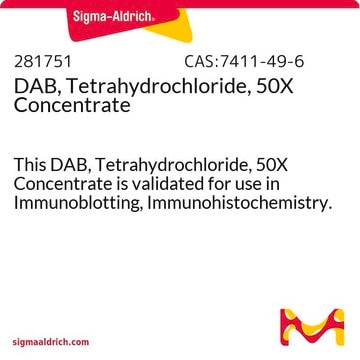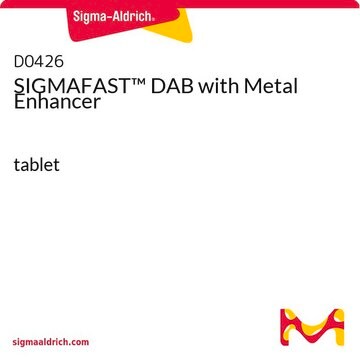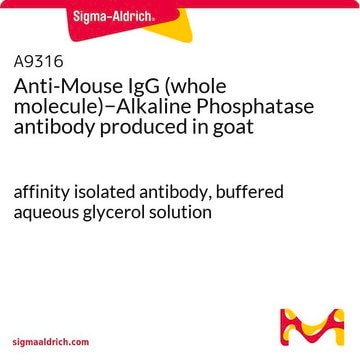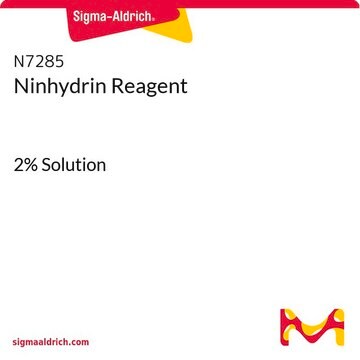D7679
3,3′-Diaminobenzidine (DAB) Liquid Substrate Dropper System
liquid
Iniciar sesiónpara Ver la Fijación de precios por contrato y de la organización
About This Item
Número de CAS:
Número CE:
Número MDL:
Código UNSPSC:
12352204
ID de la sustancia en PubChem:
NACRES:
NA.75
Productos recomendados
Formulario
liquid
técnicas
immunoblotting: suitable
solubilidad
water: soluble
Condiciones de envío
wet ice
temp. de almacenamiento
2-8°C
cadena SMILES
Cl.Cl.Cl.Cl.Nc1ccc(cc1N)-c2ccc(N)c(N)c2
InChI
1S/C12H14N4.4ClH/c13-9-3-1-7(5-11(9)15)8-2-4-10(14)12(16)6-8;;;;/h1-6H,13-16H2;4*1H
Clave InChI
KJDSORYAHBAGPP-UHFFFAOYSA-N
Descripción general
DAB (3,3′-Diaminobenzidine Tetrahydrochloride) Liquid Substrate Dropper System has been developed for use in immunohistology and immunoblotting procedures as a precipitating substrate for the detection of peroxidase activity. DAB is the immunohistology substrate of choice because it produces an intense brown stain that is easily observed. The end product is resistant to alcohol, therefore, a variety of counterstains and mounting media can be used with the DAB Liquid Substrate Dropper System. DAB Liquid Substrate Dropper System provides all of the chromogen and buffer/peroxide solutions needed to produce a fast and convenient DAB substrate solution.
Aplicación
3,3′-Diaminobenzidine (DAB) Liquid Substrate Dropper System has been used as a developer in immunohistogical examination.
Precaución
Stable at least one year at 2-8 °C.
Cantidad
Each DAB liquid substrate dropper system will provide ten individual application dropper bottles of 10 mL of a fast and convenient DAB substrate solution.
Solo componentes del kit
Referencia del producto
Descripción
- 10× DAB Liquid Chromogen 10 mL
- premeasured, ready-to-use buffer/peroxide solution for individual application 10 x 9
Código de clase de almacenamiento
11 - Combustible Solids
Clase de riesgo para el agua (WGK)
WGK 3
Elija entre una de las versiones más recientes:
Certificados de análisis (COA)
Lot/Batch Number
¿No ve la versión correcta?
Si necesita una versión concreta, puede buscar un certificado específico por el número de lote.
¿Ya tiene este producto?
Encuentre la documentación para los productos que ha comprado recientemente en la Biblioteca de documentos.
Los clientes también vieron
N M Chu et al.
The journal of histochemistry and cytochemistry : official journal of the Histochemistry Society, 37(2), 257-263 (1989-02-01)
Immunoblotting techniques are widely used for detection of antigen immobilized on nitrocellulose membranes. There are many immunolabeling methods and staining methods available to disclose the presence of antigen in such techniques. Five common staining methods each for alkaline phosphatase and
S M Hsu et al.
The journal of histochemistry and cytochemistry : official journal of the Histochemistry Society, 30(10), 1079-1082 (1982-10-01)
Three metallic ions, NiCl2, CoCl2, and CuSO4, were found to modify the color of the normally brown diaminobenzidine (DAB) reaction. The colors ranged from purplish blue (NiCl2), dark blue/bluish black (CoCl2), to greyish blue (CuSO4). We have found that the
The duality of beta-catenin function: a requirement in lens morphogenesis and signaling suppression of lens fate in periocular ectoderm
Smith AN, et al.
Developmental Biology, 285(2), 477-489 (2005)
Carola W N Damen et al.
Analytical biochemistry, 393(1), 73-79 (2009-06-16)
For the bioanalysis of therapeutic monoclonal antibodies in biological matrices, immunoassays--especially enzyme-linked immunosorbent assays (ELISAs)--are the most widely used techniques. Although ELISAs are very sensitive, the obtained sensitivity is not always sufficient. In this study, we have investigated the possibilities
Cloning and characterization of porcine aquaporin 1 water channel expressed extensively in gastrointestinal system
Jin SY, et al.
World Journal of Gastroenterology, 12(7), 1092-1092 (2006)
Nuestro equipo de científicos tiene experiencia en todas las áreas de investigación: Ciencias de la vida, Ciencia de los materiales, Síntesis química, Cromatografía, Analítica y muchas otras.
Póngase en contacto con el Servicio técnico








